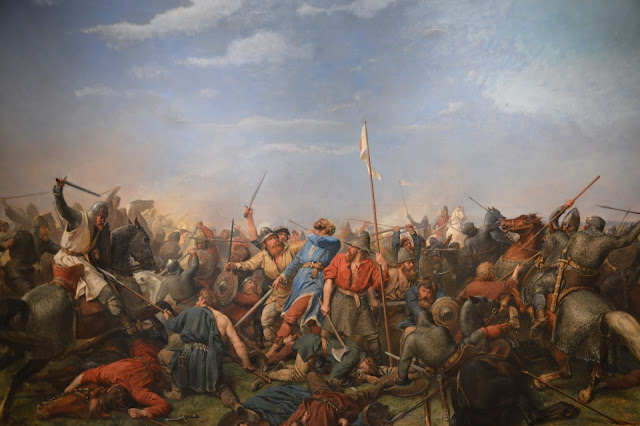In January of 1066, the King of England, Edward the Confessor, died. He had become withdrawn and indecisive in his latter days, which led to three separate claims on the English throne: Harold Godwinson (who was crowned), Harald Hardrada of Norway, and William, the Duke of Normandy. All three had fairly legitimate claims to the throne, but Harold got to it first.
Not to be deterred, both Harald Hardrada and William assembled expeditionary forces and planned an invasion of England. Hardrada was faster (maybe because he was a Viking). With 300 ships and about 9,000 men, he landed in the north and quickly took the city of York. Unfortunately for him, he underestimated Godwinson's resolve.
Harold (with an O) raced north, gathering an army along the way, and caught Harald (with an A) unaware at Stamford Bridge in September. The element of surprise was present to the extent that about a third of the Norwegian army only showed up after the rest of them were in full rout. Of the 300 ships that came to England, only 24 returned to Norway, and none of them carried Hardrada.
 |
| That's him in the blue. He just got a new neck piercing. Ill-advised, as it turns out. |
After a grueling march and gruesome battle, Harold once again drove his forces across the country to meet an invader. Many of the details are unclear, but it appears that he favored speed over replenishing his forces. By the time he reached Hastings, his men were exhausted and battle-weary, and Norman scouts had spotted them, eliminating the element of surprise.
 |
| And coffee wouldn't even reach England for another several centuries! |
When William turned out to be alive -- and noticing the buttstabby lack of discipline -- he started using fake routs to shake loose the shield walls. While this didn't get the English off the hill, it did get them to expose their flanks, to which the Normans applied a liberal amount of charging horse. Things cascaded from there. the cavalry charge opened a path toward the King and his retinue, which led to the King's death, which sent the English into a full panic and essentially ended the battle right then and there.
 |
| And look! There were only like six of them! |
Even the English language was effectively destroyed by the Norman invasion. The kings of England for centuries after the Norman invasion spoke an old form of French, which gradually merged with English into a new Anglo-Norman dialect. That brings me to one of my favorite little tidbits of tangentially related history: Richard the Lionheart, arguably the most iconic Medieval King of England, never learned English.
 |
| And he certainly never learned a Scottish accent. |
Holy shit.
"A small cup of coffee" by Julius Schorzman - Own work. Licensed under CC BY-SA 2.0 via Commons
"Sean Connery in Robin Hood: Prince of Thieves" by Warner Brothers. Licensed under Fair Use

You might say everyone got a little too...hasty.
ReplyDeleteI'll let myself out.